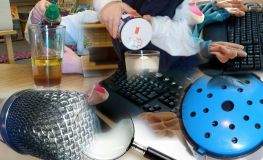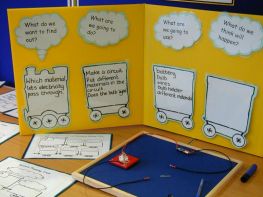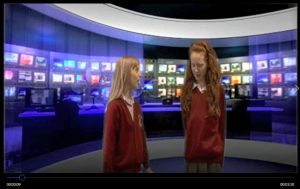Projects
Learner Response Project
A project centred on the use of Learner Response systems (LRS), how
they may impact on children’s attainment, and on developing their capacity to think and reason. One of the aims of the project was to examine verbal questioning techniques and consider how to create LRS resources to provide children with opportunities to contribute to classroom discussions in more varied ways. The project developed a collaborative network of teachers with LRS expertise using various features such as Wikis, Wall wisher and blogs. Participating teachers wrote a reflective journal evaluating their project work using the blog on the VLE.
All in all the Activexpressions have had a massive impact in the classroom; assessment is tighter, data is quickly pulled together and more importantly, the tasks and assesments are enjoyed and unpressured. I would now struggle without them and feel they have had a massive impact on my teaching and ability to assess where the children are, and although the process can be time consuming, it is definitely worth it.”
I think this is a phenomenal tool and allows you to take teaching to another level. What else can give your whole class assessment information that quickly?”
The project has been extremely enjoyable and exciting! The impact on children has been very surprising. It initially improved their motivation and ensured all children participated in answering questions and giving opinions. I thought that this enthusiasm may decline after a short while but the children are still keen to use them. Everybody in class still does some sort of celebration whenever I say to them to get them at the ready!”
The children in my class have been highly motivated by the use of Activexpression kits. I have had comments such as, “they are cool”, “when can we use them again?” and “why don’t we use them for spelling?”. They have become very used to the kits and are happy to answer questions that need either number or word answers.”
Thinking is focused because children want to take part, and less able children in particular know that the teacher can access their votes without others seeing. The teacher is able to collate results and then focus on misunderstandings with individuals without children knowing who has misunderstood. This is extremely important for self-esteem.”
I have thoroughly enjoyed developing resources to use in class with the pods and have found both Activinspire and Activexpression easy to use. It has enlivened teaching sessions and made them more interactive. The children are always excited when we use the pods and each and every child engages in the sessions when they know they will get the opportunity to send an answer.”
The children thoroughly enjoy using them as part of their learning and I have found that they are actively engaged more during lessons when the voting kits are used. Being able to elicit a response from 32 children at once is obviously fantastic in terms of participation, but it is the data which can be harvested which is the most powerful part.”
It is an excellent resource for instant whole class assessment. It enables you to check answers submitted by children and correct any mistakes / misconceptions before moving the lesson further.”
Children are instantly engaged and keen to participate. It is an inclusive resource which encourages all children to participate fully, whereas other methods don’t always fully achieve this.
Puppets Project – ICT and Primary Science 
This ICT and Primary Science Project focused on enquiry based learning in science through the use of the PUPPETS Project materials created by Millgate House to engage and motivate children. It promoted the creative use of new technologies in schools with reference to ICT Applications in Literacy – Speaking and Listening Element including the use of digital story telling via multimedia programs, digital video and animation software.
What were the outcomes that contributed to improving teaching and learning?
“Practical guidance – supporting Assessment for learning through the use of ICT”
“Application of Interactive Whiteboard to enhance teaching and learning”
“Excellent ideas for linking across curricular subjects”
“More interactive lessons to keep children focused”
What did you gain personally from this session?
“Exposed to ICT possibilities!”
“Ideas to involve children in practical work when using Interactive whiteboard – recording sound”
“Confidence in using the Interactive Whiteboard in science”
“Fantastic resources and new ideas for how to use the tools on the Interactive Whiteboard”
“Fantastic ideas from IT to enlighten and extend my thinking when teaching science”
 Primary Science Assessment and ICT Project with Sheffield Hallam University
Primary Science Assessment and ICT Project with Sheffield Hallam University
Top Marks was a CPD Project on Science Assessment and ICT with Sheffield Hallam University that was undertaken during 2010 – 2011. This project aimed to develop sets of ‘rich tasks’ for primary science that would engage, empower and invigorate assessment. One of its aims was to explore the potential of using ICT to facilitate the recording and evidencing of pupils’ progress, and integrate the development of children’s personal, learning and thinking skills. Schools collaborated via a wiki, video conferencing and face to face training. The project is published on the Primary Science Teaching Trust web site. http://www.pstt.org.uk/resources/continuing-professional-development/top-marks.aspx
Top Marks was a highly innovative Continuous Professional Development project funded by AstraZeneca Science Teaching Trust. The project ran from September 2010 to July 2011 and involved two primary schools and one secondary in Sheffield and two primary schools in Stockport, it was lead by the Centre for Science Education, Sheffield Hallam University with the support of educational consultants from Stockport Local Authority.
Top Marks invigorates the assessment of science with fun, relevance, real life and engagement for youngsters. What has emerged is a set of resources, developed by teachers, that support standards in science, engage learners and make assessment an exciting part of school life. We are proud of the model of ‘rich tasks’ that developed during the course of the year which we feel is a fantastic way of designing the science curriculum with assessment built-in.
This CPDU presents 10 ‘rich tasks’ for primary and lower science that we hoped will engage, empower and invigorate assessment in your classroom. They explore the potential of using ICT to facilitate the recording and evidencing of pupils’ progress, and integrate the development of children’s personal, learning and thinking skills.
Top Marks – Making Assessment Real https://www.pstt-cpd.org.uk/ext/cpd/top-marks/?az=/
Learning outside the classroom project (LOtC)
The Learning outside the classroom project used the virtual learning environment (VLE) to promote collaborative working practices. Teachers presented their projects at a termly network meeting for subject leaders; case study materials, video diaries, photo galleries, examples of children’s work and tips on how to develop a project were available on the LOtC VLE for subscribing primary teachers. A forum provided the opportunity for users of the site to provide feedback.
-
Illustrate connecting ICT and geography
-
Develop and establish a collaborative network of teachers
-
Explore creative approaches to teaching and learning
-
Illustrate an enquiry led approach
-
Exemplify effective practice within the area of learning – “Geographical, Historical and Social understanding” and “Essentials for Learning and Life”- ICT capability (New Primary Curriculum)